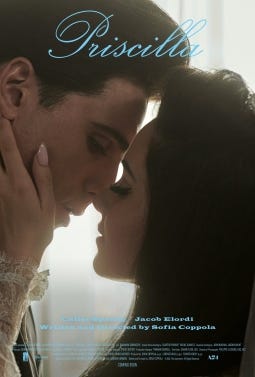"Between the Temples" Humbly Examines Faith
Jason Schwartzman plays a Jewish cantor and widower whose path to rediscovering joy is anything but ordinary.
In the Jewish faith, a cantor leads the spiritual accompaniment to prayer and song, singing the verses of the prayer and connecting congregants to ancient liturgical traditions and communal existence. The ability to sing is integral to the role, as is often being called upon to officiate at key Jewish milestones, like B'nai Mitzvahs [Bar and Bat Mitzvahs].
In the film Between the Temples [Trailer], directed by Nathan Silver, Ben Gottlieb (Jason Schwartzman), a 40ish-year-old cantor working at an upstate New York synagogue, has lost the desire to sing and, as such, lacks purpose in his job and in his life. Ben lives with his well-intentioned moms, the domineering Judith, and the neurotically artistic Meira in the basement even though he owns a home down the street. He’s in a rut, experiencing an existential crisis of faith, and unable to find meaning.
Rabbi: Ben, how are you doing?
Ben: I feel like I’m hanging.
…Feel like I’m hanging in there.
I started Googling “Ben Gottlieb.” There are 12,000. My name comes up on page 7 and that’s with qualifiers.
Ben. Even my name is in the past tense.
Then, one day, in walks the 70-ish-year-old Carla O’Conner nee Kessler (Carol Kane), Ben’s former grade school music teacher, who asks him to help her prepare for her Bat Mitzvah. Carla is loud, assertive, and quirky in a way that disrupts Ben’s despondent zen. He appears to be put out by her brashness and is at first reluctant to help her. Typically, the age of Bar/Bat Mitzvah students is 13 for boys and 12 for girls. To convince Ben to take her on as a student, she tells him a revealing story about her childhood circumstances, underscoring the urgency of why having a Bat Mitzvah is so important to her. There are many details in the story, and after she’s done, she requests that Ben repeat back to her what she just said, in true teacher fashion, but also to ensure he really has listened. In the minutes that follow, in retelling her moving childhood story, Ben comes alive, the light from the window panning on his face. Schwartzman’s Ben transforms from a sad, lifeless man reminiscent of Steve Carell in just about any role where he plays a depressed middle-aged man (Dan in Real Life, Little Miss Sunshine) into the winsome Schwartzman of wistful whimsy and hopeful delirium (Rushmore).
As the film unfolds, we discover that Ben’s now-deceased wife, “an alcoholic writer” (as he describes her), died a little over a year ago when she slipped on the sidewalk one night after getting drunk and cracked her head. This alone would sound incredibly sad if Ben himself wasn’t so matter-of-fact about it as he relays it to a potential new love interest, Gabby (Madeline Weinstein), the rabbi’s daughter, who is undergoing her own sad year, resulting from her fiance breaking off their engagement. Gabby is one of many potential matches being set up with Ben by both his mothers and the temple’s congregants in an attempt to find him a shidduch [Yiddish translation: Jewish love-match for marriage].
Despite being set up with much younger women, Ben is drawn to the less conventional choice in the older, more experienced Carla in a way that could easily draw a comparison with the 1971 classic Harold & Maude, which found a suicidal 20-year-old obsessed with a fun-loving 80-year-old eccentric. Here, the age difference and life experience are not as stark a contrast. Ben is middle-aged. Both Carla and Ben have lost a spouse. Both share a love for music and have (or had) a career involving it. Ben’s relationship with Carla grows as he continues to prepare her for her Bat Mitzvah, and she reminds him of who he used to be and still is, even showing him the VHS from his Bar Mitzvah ceremony to illustrate the joy he took in singing once and in a desire to have him recover it.
Carla: Do you ever feel like your brain is having a heart attack?
Ben: Yeah, all the time.
The Time & Place Effect
The film is shot in a grainy 16mm style with plenty of close-ups and wobbly, hand-held effects reminiscent of films from the 1970s. In one scene, toward the end, Ben’s family plays a game of telephone or whisper-down-the-lane around the Shabbat dinner table. As each person is whispered to, the shot goes black before the next person is flashed on, alternating between movement and stillness. The indie, arthouse cinematic effects are somewhat commonplace in the film, but they’re not distracting. Rather they are used in a way to further the storytelling or showcase an escalating mood or lack of control, such as when Ben inadvertently drinks tea laced with shrooms.
In another nod to the ‘70s, the soundtrack for the film is almost entirely Israeli singers from the ‘60s and ‘70s, like Matti Caspi, Arik Einstein, and Boaz Sharabi (Pamela). Even Cane’s Carla has a record she pulls out that she produced in the ‘70s and plays a song from it, which could be a song sung by Marianne Faithfull.
On the topic of Israeli music of the past, read Liat Portal’s piece on Ofra Haza here.
So, You Want to Laugh?
Side Note: While this is a serious film, it's also incredibly funny in smart, emotionally intelligent, and in very Jewish ways. I’ve long been a fan of Carol Kane, since her early Mel Brooks films, Taxi, and even in her Unbreakable Kimmy Schmidt smaller role. She’s been nominated for a few awards already for her performance as Carla. Jason Schwartzman finally won me over as Ben. He had to go full-on middle-aged sad/funny man Steve Carell for this to happen. My one wish for all TV and film-goers is to prioritize this over Nobody Wants This [Review here] in the category of authentic Jewish representation. If you have to pick one, please pick this one.
In Summary - It’s All in the Film’s Title
The double entendre of the film’s title, “Between the Temples,” is intentionally vague. It could reference a physical place of worship, a synagogue, or the temple as a body—two individuals, like Carla and Ben. It could allude to the period between the destruction of the two temples in Judaism in 586 BCE and again in 70 CE and the effect this had on the Jewish population - ingrained resilience, a need to adapt to survive as a people. Any of these interpretations could reflect the challenges faced by Carla and Ben, as well as their eventual connection with one another.
In the first half of the film, Carla tells Ben that the first Bar Mitzvah was performed over 100 years ago, in 1922, at someone’s home, and not even in a temple. As the film comes to a close and reaches its full circle moment, we see the reprise of this in Carla’s simple outdoor service with only Ben present. The last line recited by Carla in her Bat Mitzvah Hebrew prayer is loosely translated as “And you like your friend as you like yourself,” which could point to the connection between bodies—both spiritual and physical. In any event, it’s a return to a simpler faith, that which exists between two people who care a great deal for one another.
TIME IS RUNNING OUT TO CAST YOUR VOTE
Cast your vote for the top 2024 TV and film performances here
The big winners’ reveal will be on January 4th.
Twin Films - MUSIC Themed Fun
For January’s Film Chat, we’ll discuss “Twin Films,” which refer to films with the same or similar plots released at different studios at different times.
In January, we will discuss Baz Luhrmann’s Elvis (2022) on 1/12 and Sofia Coppola’s Priscilla (2023) on 1/19.







This sounds wonderful and very un-Hollywood which I appreciate. The grainy filmmaking wasn’t distracting? Thx for this terrific review.
I admit I had to look up Carol Kane because I never remember names. I looooooved her in Unbreakable Kimmy Schmidt. Such an iconic character and she's one of those actresses that's just really memorable.